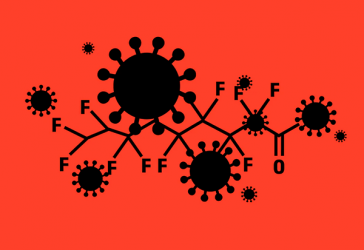
As the Covid-19 pandemic continues to unfold globally, scientists are trying to understand the virus’ many impacts on human health. To this end, STEEP co-lead and Harvard epidemiology professor, Dr. Philippe Grandjean conducted a recent study analyzing the association between PFAS exposure and Covid-19, due to the known capacity of these chemicals to reduce immune functions in humans. The study involved 323 patients with Covid-19 and analyzed their blood for the presence of five PFAS compounds. It found that one PFAS compound, PFBA (perfluorobutanoic acid) was associated with a more severe form of the disease. More than half of those seriously ill with Covid-19 had elevated PFBA levels in their blood plasma, while less than 20 percent of those with mild illness had elevated levels of the chemical.
PFBA has been thought of as a relatively “safe” PFAS compound because this smaller molecule remains in human blood for far less time than some of the other compounds in the class, such as PFOA. PFBA has therefore been used pervasively by industry members as a substitute for PFOA, since it’s phase out in 2015. Although PFBA exits the bloodstream relatively rapidly, it accumulates in the lungs, which likely explains the finding of this study. “It’s probably what’s in the lungs that counts because that’s where the big Covid battle is fought,” said Philippe Grandjean. Elevated levels of PFBA are found in human blood all over the world, and a sample study conducted by 3M, the original manufacturers of PFBA, found it in 55% of the general population.
Grandjean’s previous research has shown that higher PFAS levels in children correlated to weaker response to various vaccines—and he fears the same will be true for a Covid-19 vaccine. “I would think what we’ve seen before is very likely to happen again,” he said about the vaccines now in development for Covid-19. He suggested that communities that have elevated levels due to industrial contamination should get special consideration when a vaccine is distributed. “They may need more than the 1 or 2 shots recommended for everyone else because their antibody production may be suppressed.”

